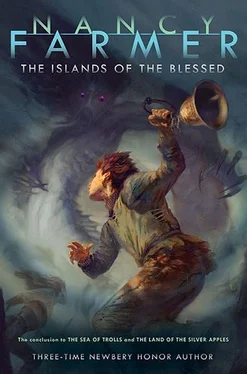“You! Wizard! Why have you come?” the abbot said.
“And a very good afternoon to you too,” said the Bard. “Do you remember Jack and Thorgil?”
Father Severus cast a piercing look at the two. “Oh, yes. The pair that brought down Din Guardi. It’s back again, you know. My monks built it.”
Jack felt uneasy at the words my monks.
“With help from the Lady of the Lake,” said the Bard.
“That vile witch,” swore the abbot. “It should have been a proper fortress, and her mincing sorcery turned it into a playground.”
“It isn’t as though Brutus is a warrior,” the old man remarked.
“He does nothing. Nothing! Parties all night, sleeps all day. If anything needs doing in Bebba’s Town, the people come to me.”
“I’m sure you tell them what to do,” the Bard said.
Father Severus glared at him. “So what if I do? These people need a firm hand, and most of them are pagan backsliders. I’ve gotten rid of naughty practices like Yule singing and dyeing Easter eggs, but they still sneak into the woods for May Day. Well, why are you here? I have confessions to hear and penances to hand out.”
Jack couldn’t believe the change that had come over Father Severus. What had happened to the man who’d sheltered them in Elfland and given them hope when all seemed lost?
“I, too, have important business,” the Bard said quietly. “Something to do with mermaids.”
For an instant Father Severus looked startled, but just as swiftly he recovered. “That matter was concluded years ago. It was bad judgment on my part, but no harm was done.”
“Much harm was done,” said the Bard. He recounted the arrival of the draugr and the havoc she had wreaked.
“How can you expect me to believe that tale,” the abbot scoffed. “A wolf slaughters a lamb, a cow bellows in the woods, and everyone panics.”
“I saw the draugr. So did Jack.”
“Oh, that’s a fine source of information—a wizard and his apprentice.”
Jack was beginning to dislike Father Severus. “Brother Aiden believes in her too,” he broke in. “He says a wild animal wouldn’t kill things without eating them.”
The Bard put his hand on the boy’s shoulder. “That’ll do, lad,” he murmured. He looked up at the abbot. “Severus, you were responsible for the mermaid’s death. Did you think there’d be no consequences? She has appealed for justice before the councils of the nine worlds.”
“This gets better and better.” Father Severus laughed, a hollow, cheerless sound, and Jack remembered that he had never been good at laughing. “There are only two worlds: this one and the world to come. Now I’m supposed to worry about a creature with no soul coming back from the dead. She complains to councils that don’t exist, and a wizard with nonexistent powers comes along to threaten me.”
“You take that back!” Jack shouted. The Bard held out his staff, and the boy felt a wave of heat.
“Stop wasting my time and run along,” snarled the abbot.
“You leave me no choice,” the Bard said quietly. “Jack, unwrap Fair Lamenting.”
The boy’s hands trembled as he put the bundle on the floor and fumbled with the cords binding it. Thorgil bent down and cut them with her knife. “This will be fun,” she whispered. Jack wished he were as calm about calling up the draugr, but then, he’d actually seen her and Thorgil hadn’t.
“Fair Lamenting,” murmured Father Severus, and for once he didn’t look so confident. “It has been long since I heard it. If it hadn’t been St. Columba’s sacred bell, I would have sunk it in the depths of the sea.”
“You would have done better to sink yourself,” the Bard snapped. “Last chance, Severus. Shall we discuss how to deal with the draugr, or should Jack ring the bell?”
The abbot drew himself up, tall and proud. The man had courage, Jack conceded unwillingly. He’d faced down Northmen and the Elf Queen. He’d offered himself as a sacrifice in place of Pega. He had confronted Hell itself, and if he’d fallen to his knees in terror, it didn’t lessen his nobility. They had all cowered.
“There is no draugr ,” Father Severus said. “I am a Christian. I do not believe pagan lies.”
The Bard nodded. Jack quickly unwrapped the layers of cloth, and the object within rolled over the floor with a clanging and clanking.
It was a small copper cauldron with a stone inside.
Father Severus barked a startled laugh. He bent over with mirth, slapping his knees with his hands. “By blessed St. Bridget, there’s no Fair Lamenting, either! This is a fine joke, wizard! Did Brutus put you up to it?”
The Bard, Jack, and Thorgil could only stare, thunderstruck, as the cauldron came to a halt against a wall.
“Nothing to say?” the abbot jeered. “Then be off with you!” He clapped his hands, and a pair of hefty monks came through the door. The Bard, Jack, and Thorgil left with as much dignity as they could muster.
Chapter Nineteen
FIND TANNERS
“The Tanners did it,” Jack said at last, after they had traveled several miles. The Bard had gone ahead and the air around him had swirled, and his pony had laid back its ears in fear. But finally the air cleared. The pony’s ears went up, and Jack dared to break the silence. “We know they’re thieves. No one else would have done it.”
“They stayed behind when we camped on the beach,” Thorgil said. “They claimed to be afraid of Schlaup, though anyone with sense could see his good character. I wonder what else the Tanners took.”
“I should have brought Fair Lamenting ashore with me,” said Jack. “The minute Ymma and Ythla thought they were alone at the farm, they went through everything. I should have known they’d do the same thing on the ship.”
“I don’t blame you, lad,” the Bard said. “I was also entirely too trusting.” They stopped at a flowery meadow beside a rushing stream. Thorgil took off her boots and led the ponies into the water, where they drank noisily and sloshed their hooves. After a while she led them out to graze. The Bard broke the seal on the flask of mead and drank morosely.
It was getting close to sunset. Long shadows stretched across the grass and swallows dipped and fluttered in the upper air. “Mrs. Tanner said she was going to her brother,” Jack said. “Perhaps King Brutus could help us.”
“Brutus couldn’t find his crown with both hands,” said the Bard. “There are a thousand people in this town—farms and houses everywhere. We don’t know what her brother does for a living; to go by her, he’s probably a pickpocket. We don’t know what he looks like.”
“The arrival of a widow with two daughters can’t be that common,” Jack pointed out. “King Brutus could send out searchers. In time—”
“In time! We don’t have time, lad. If someone rings that bell, we’ve had it. Which brings me to the question, how did the Tanners know where it was?”
“Ymma and Ythla were always lurking about,” Jack said bitterly. “They saw me carry a mysterious bundle to the ship and decided to look inside. They knew enough to substitute one of Egil’s copper cauldrons.”
“I hate the sight of that wretched pot,” said the Bard, swigging more mead. Jack had brought the small cauldron back with them. It belonged to Egil, after all, and was valuable. It was a rich red-gold color, reflecting light from a dozen surfaces made by the artisan’s hammer. Egil said it had been made by men burned dark by the sun, the same ones who had traded merini sheep to him.
Thorgil returned from tending to the ponies and settled herself on the grass. She, at least, was in a good mood. The long ride and misadventure at the monastery had amused her. Her cheeks were rosy and the sun had brought out a spray of freckles on her nose. She was as finely dressed as a young knight. But where a year ago she had been easily mistaken for a lad, subtle changes had occurred. Her waist was more defined, her mouth was softer, her chest—
Читать дальше










